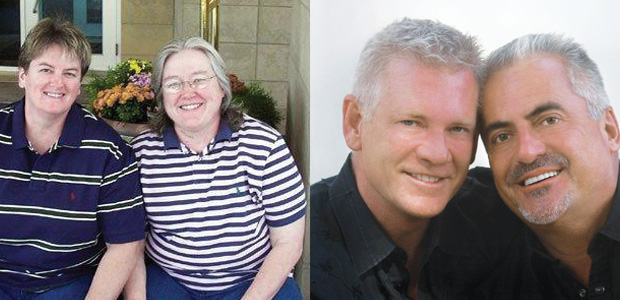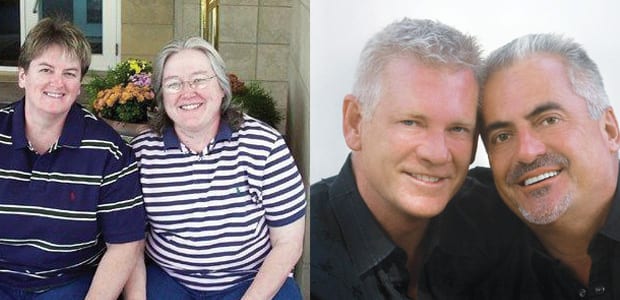
CALIFORNIA DREAMIN’ | Claudia Kramer and Terry Samford plan to leave Texas for California. Mark Reed and Dante Walkup are considering the Golden State.
Claudia Kramer and Terry Samford are planning to move to California.
“We’ve talked about leaving Texas for awhile,” Kramer said.
With the Supreme Court rulings on Prop 8 and the Defense of Marriage Act, the couple is thinking about it even more seriously.
Samford was born and raised in Texas. Kramer has lived here for 40 years. In addition to their jobs, a few things are keeping the couple in the Lone Star State for now.
Kramer’s mother has been ill and they can’t move her. And the couple’s son will graduate next year. She said if their son gets a scholarship, that’ll relieve much of the financial burden of moving.
Samford visited California for work last year and said that is where she’d love to settle. Kramer said she and her partner are both in IT and don’t expect finding jobs in California would be difficult.
Kramer went back to school and will be finished in September.
“We were going to go to Disney World in Florida to celebrate,” she said.
Instead, they decided to go to California to get married.
Kramer and Samford are among many local same-sex couples who are re-evaluating their decision to live in Texas in the wake of the rulings.
Experts say it’s too soon to determine which federal benefits gay couples who are legally married in other states will be eligible for in Texas.
As federal agencies issue more guidance about taxes and benefits, couples can determine if they should head to another state to get married and return to Texas — or if they’d be better off residing somewhere else.
Evan Wolfson, executive director of the national group Freedom to Marry, said even couples in Texas will have some new protections. He called the decision to marry a very personal one.
“Likewise, decisions about where to live are also very personal,” he said. “Certainly it’s true people in Texas will experience discrimination they won’t experience in other parts of the country.”
He said from an advocacy standpoint, both staying in Texas to fight for equality and leaving the state send important messages.
Wolfson said he expects to see progress in several more states this year. New Jersey, Illinois, Hawaii and Nevada may upgrade from civil unions to marriage. But he doesn’t expect any ballot initiatives to overturn anti-marriage amendments in 2013.
Ken Upton, Lambda Legal supervising senior staff attorney, said some benefits flow from where couples are married and others from where they live.
While the Defense Department already announced that same-sex couples will get all the housing, medical and other family benefits heterosexual couples do, veterans may not. Benefits that flow through the Department of Veterans Affairs are controlled by law and are determined by state of residence.
Social Security and Medicare also look at place of residence for some benefits, Upton said.
“If the only reason you’re moving is to get benefits, it should be substantial benefits,” Upton said.
Before moving, he suggested taking into account state income taxes in other states as well as the higher cost of living in the Northeast and on the West Coast. But he said he believes some people will ultimately move because of how they’re treated.
Upton said two groups are more likely to move than others — those who are young and just starting a career and those who are retiring.
Those beginning careers may search for opportunities in marriage equality states. Those retiring might prefer to live in places where their long-term relationships are respected, especially in case they need to deal with assisted living and other healthcare concerns.
“What the IRS does has a lot of implications,” he said.
He expects the IRS to begin making rulings this year on issues such as whether domestic partner benefits should be taxed if a couple is married.
For those who plan to stay in Texas, Upton warned against marrying in another state as an emotional reaction to the Supreme Court rulings. Divorce options are limited, and it’s unclear what the benefits will be.
“By the fall, we’ll have worked through much of the guidance,” he said. “There’s little justification for hurrying.”
Meanwhile, a number of Dallas-area couples are deciding whether they have a future in Texas.
Chris Green and his husband were married in Washington, D.C., last year and are looking to move there or nearby marriage-equality states Delaware or Maryland next year. They made their decision as they began doing some estate planning.
“Seeing stories of what people in Texas have gone through helped us decide,” Green said.
They’ve put their house on the market and plan to live in an apartment to save some money before their move.
After the high court rulings, Mark Reed and Dante Walkup spent the weekend in San Francisco. Reed said he and his husband have thought seriously of moving.
“Especially after celebrating with all those happy people,” Reed said.
Reed and Walkup were married in Washington, D.C. Reed is a former GetEQUAL board member and he and Walkup convinced the Dallas Morning News to begin publishing same-sex wedding announcements a few years ago.
Their LED lighting company is web-based, so they could relocate. The company’s signature projects, Reunion Tower and Davis Building in Dallas, were targeted and they could approach building owners wherever they lived.
“But we go back and forth,” he said. “We also think we should stay and fight.”
But even if the couple decides to stay, Reed said they’re planning to retire in five years and if they haven’t moved by then, they’ll probably relocate to San Diego or San Francisco.
“It’s frustrating when you live in a state with an anti-gay governor and a city with a mayor who doesn’t put his money where his mouth is,” he said.
This article appeared in the Dallas Voice print edition July 5, 2013.


